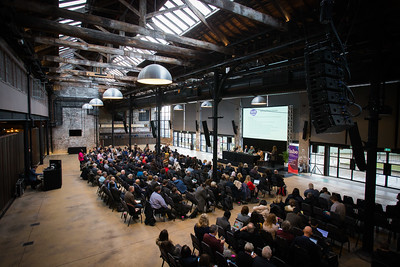Introduction
My name is Aleia and I’m in my third year of a PhD program at the Gordon Institute of Business Science at the University of Pretoria in South Africa. My research focuses on the qualitatively different ways in which social entrepreneurs experience learning inside of incubation programs in South Africa. Over the past year, my research design has allowed me to meet and interview key players in the thriving startup ecosystem that exists in South Africa.
Main Text
As an Early Career Researcher in a developing country, ISBE was the first opportunity I had to present my research outside of South Africa. While I’ve had plenty of opportunities to present in front of classmates and faculty at my school, there is an absence of academic conferences on the African continent. Attending ISBE not only gave me a forum to share my work with scholars and practitioners, but to share it with an international audience as well.
Aside from the conference itself, I learned an incredible amount during the submission process prior to the conference. The first step in being accepted to present at ISBE was the submission of a 2,000-word abstract that fit this year’s conference theme, SPACE – exploring new frontiers and entrepreneurial places. The abstract was submitted into one of seventeen conference tracks. After carefully reviewing the descriptions for each track, I was torn between the Social, Environmental, and Ethical Enterprise track and the Enterprise Education track as my research could fit into either. For the first time, I had to think about where my research “home” might be. After careful reflection on my future research aspirations and discussions with my supervisor, I decided to focus on the Social, Environmental, and Ethical Enterprise track.
Writing the abstract for ISBE was good practice in ensuring that my research, though based in a developing country context, was intriguing to those beyond the borders of South Africa. After a review by multiple people in the track, abstract feedback was given. Feedback at this stage was important as it served to tell you how clearly you articulated your research in short form as well as identified areas that needed clarification. My abstract feedback unsurprisingly focused on the context of South Africa, but in a way that encouraged me to think beyond merely justifying the context of study and instead how the results may be useful to those in a different context, even in a developed country. It was a relief to know my research resonated outside of South Africa, and I went to work writing my full paper taking into consideration the feedback provided on the abstract.
For me, writing the conference paper was the first time I was attempting to distil my in-progress thesis down to paper length. It was a huge challenge to figure out how to include enough detail and contextual information within the confines of the 20-page maximum requirement. The head of the Doctoral Program at my school has always ensured we understand that the unfortunate reality of conducting research in an African context is that you must give up more space than others in order to thoroughly explain the context in which your research is based as well as argue as to why those outside the African continent should care about your research. Keeping both this and my abstract feedback in mind, I went to work on my paper. Once the conference paper was reviewed, feedback was again given by reviewers, but this time in more detail. The level of feedback on the paper was similar to what is received from journal reviewers and from thesis examiners and therefore extremely valuable to keep in mind for future submissions of my work. The feedback I received was insightful and offered advice on how to elevate my paper.
To prepare for the conference, we were required to summarize our paper into a presentation of no more than 6 slides that took a maximum of 15 minutes to discuss. During ISBE, we split into rooms according to tracks. Each person presented their research in an interactive session where questions and feedback from the audience were solicited. This served as both positive feedback and constructive criticism. For me, the thought-provoking questions that challenged my work and my ideas were particularly important. I also received advice from senior researchers on how to handle a major aspect of my research I was struggling with. Presenting in front of researchers from various countries allowed me to hear opinions from those with different perspectives and points of view and made me think about areas of my research that I should clarify, justify, or emphasize.
Aside from the beneficial personalized feedback on my own research, I benefitted greatly from listening to others present their work. As most research presented had yet to be published, I was able to hear about cutting edge research in my field. The topics discussed served as an indicator of trending topics and where the field is heading. I was also inspired by the diversity in topics which sparked thoughts about my own personal future research topics. Seeing what those in other countries are researching opened my mind to new possibilities and forced me to think about how those possibilities could work in a South African context. Additionally, I learned by simply listening to the feedback others got on their presentations. Thinking about how I could apply some of their feedback to my own research was incredibly useful. Finally, I learned a lot about what questions to ask by listening to what other senior scholars in the room were asking. This will serve me well at future conferences and as I advance my scholarly career.
One of the biggest benefits of attending ISBE was being able to network with others in my field. As a researcher in a developing country, I don’t have access to a large network and being able to meet other scholars was highly valuable. Not only did connecting with other Early Career Researchers help form a community of support through the PhD process, it may lead to future research collaborations as well. Further, having conversations with established scholars in the field resulted in advice, feedback, and guidance. It also felt a little surreal to meet people that you read and cite regularly. One thing I found particularly insightful was to speak with those researching similar topics in another context and comparing how our research may be similar or different.
ISBE also alerted me to future opportunities such as post-doctoral positions and research fellowships. Future funding opportunities were also a topic of discussion. Additionally, there were discussions on publishing a book or a book chapter as well as information on upcoming special issues of journals. ISBE even offered an opportunity to meet editors from top journals, hear them present their own research, and listen to feedback they had on others’ research. As a researcher on the African continent, these types of opportunities are incredibly rare.
Stepping out of the African continent to attend ISBE was one of the most beneficial experiences I’ve had during my PhD. Hearing research from other contexts, receiving feedback from those with different perspectives, and networking with a global audience of scholars were the highlights for me. Being part of this international conference was key in helping me strengthen my thesis before submission as well as encouraged me to think about my path post-doctorate.




